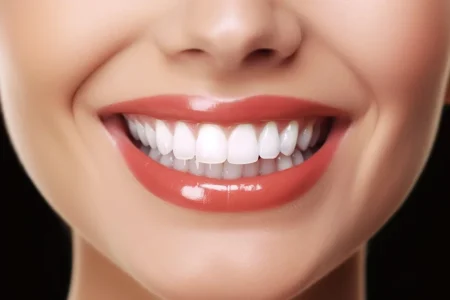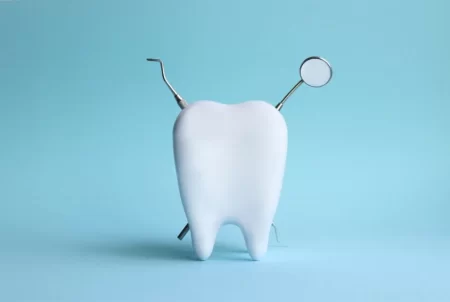What Kind of Teeth Whitening Is Right for You?
- Updated on: Jul 6, 2024
- 4 min Read
- Published on Sep 2, 2022

Who does not want whiter teeth? Many patients visit our cosmetic dentist in Dearborn looking for cosmetic dentistry for a better appearance. Your smile is your best presentation card, and thanks to cosmetic dental procedures, it is possible to enhance it!
What is Cosmetic Dentistry?
Cosmetic dentistry is the field that enhances smiles in many ways – the colour, shape, and size of teeth.
Among the procedures in cosmetics, you may acquire teeth whitening near you. We offer three types for our patients, and the results are excellent in each case.
Types of Teeth Whitening
We offer professional, home, and laser teeth whitening in Dearborn.
1. Professional Teeth Whitening
The professional is the in-office one. You may visit a cosmetic dentist near you for information, ask about the costs, and what to expect.
The first step is placing a retractor on your lips to separate them from the dentition. The bleaching agent is harmful to the soft tissues; hence, this device is necessary. Then, they will add resin over the gum line because the retractor does not protect the gingiva.
The doctor will apply the bleaching product (carbamide or hydrogen peroxide) with a pen or a brush and let it act for 20-25 minutes. Next, they will wash and dry it and add another application (same time). With two layers, teeth are like pearly whites. A third application is optional.
Once they remove the product, they will add a desensitizing gel. You may take Ibuprofen or Acetaminophen if sensitivity persists during the day. It is common to feel it for approximately 48 hours, although some people do not get it.
2. At-Home Teeth Whitening
Whitening your teeth from home is an excellent option; however, we recommend professional guidance before. There are many products available, and if you do not consult with your dentist, you may choose an abrasive one. A dental professional will choose the best one according to your case.
At-home whitening kits usually have from 3% to 10% hydrogen peroxide. The dentist will prescribe it for one to four hours daily for a month.
The first thing they will do is take moulds off your mouth for whitening trays. A dental technician will create them. They are customized plastic trays where you pour the whitening product and wear them for the estimated time.
Since the dose is lower, the results take longer. In-office whitening requires one hour to enhance your smile, while this method takes about a month and a half.
As for sensitivity, there is barely any since the product is not too concentrated. However, the kit comes with a desensitizing gel. You may place it inside the trays and use it for ten minutes before bleaching and ten minutes afterward.
3. Laser Teeth Whitening
Another method you may hear often is laser teeth whitening. It is an in-office method, with the difference that the dentist activates it with a laser (a blue light). You will wear protective goggles in the meantime not to harm your eyesight.
Some dentists state that laser speeds treatment. Instead of 20-minute applications, they add the product twice, eight to ten minutes each. Nevertheless, there are no scientific studies that it works. The results are the same, but they charge you way more with this method. We advise our patients not to get the laser one, as there is no difference except the price.
Choosing to whiten your teeth in a dental office or at your house will depend on your preferences. Both methods work excellently and last up to two years if patients take good care of their dentition.
Choosing the right option for teeth whitening in Dearborn depends on a lot of factors — your budget, your timeline, your preference for DIY options or professional support from a dentist near you, and whether your teeth are discoloured or stained by intrinsic or extrinsic factors. Let’s take a closer look at the types of intrinsic and extrinsic sources of stains and discoloration and how to deal with them.
Intrinsic factors that stain your teeth, and what to do about them
The effect of intrinsic factors is to produce stains within your teeth and underneath your enamel layer. The most common intrinsic causes of tooth discoloration include the side effects of some medications (such as antibiotics like tetracycline and doxycycline taken by children, mouthwashes containing chlorhexidine and cetylpyridinium chloride, antihistamines, antipsychotic drugs, and antihypertensive medications), tooth decay, trauma or injury sustained by your tooth or teeth, genetic influences or even the application of an excessive amount of fluoride. Any trauma, disease or illness that affects the development of teeth enamel in infants, children, adolescents or teens can cause discolorations in teeth later in life. Some treatments for serious illnesses that don’t themselves affect teeth enamel — chemotherapy and radiation treatment for cancer, for example — can also stain teeth enamel.
Intrinsic stains often look more gray than yellow or brown. Those interior gray stains are less susceptible to being resolved by over-the-counter whitening products. To achieve whiter and brighter teeth if those teeth are discoloured by intrinsic stains, cosmetic dentistry treatments such as dental bonding, porcelain veneers or even porcelain crowns may be better options than undergoing teeth whitening near you.
Extrinsic factors that stain your teeth, and what to do about them
Extrinsic factors that affect your teeth from the outside stain the outermost enamel layer of your teeth. The most common extrinsic factors that affect the colour of your teeth are the foods you eat, the beverages you drink and the tobacco you smoke. Foods and drinks receive their unique colour from chemical compounds called chromogens. Other foods and drinks contain yellowish or brownish and bitter-tasting substances called tannins. Tannins are biomolecules that can bind to organic compounds. Those chromogens and tannins can, in many cases, stain the enamel on your teeth. Common foods and beverages that can stain teeth from the outside include coffee, tea, colas, red wine, fruit juice, soy- and tomato-based sauces, balsamic vinegar, curries, some spices and many berries.
Smoking works slightly differently. Nicotine produced when you smoke is itself a colourless substance but, when combined with oxygen as you smoke, produces a yellowish substance that stains your teeth by being easily absorbed into the pores of your teeth. Your teeth appear entirely solid and smooth, but they’re actually permeated with pores that can allow the accumulation of stains and deposits that affect the appearance of your teeth.
There are several options for removing extrinsic stains, ranging from whitening mouthwashes, whitening gums, whitening strips purchased at drugstores and grocery stores, professional teeth whitening by a dentist near you, and even dentist-provided whitening kits that you can use at home. All of those options can produce some whitening effect over time, but the quickest, safest, most comfortable and most effective alternative for whitening your teeth is professional teeth whitening by a dentist near you. Your dentist will use powerful bleaching compounds targeted precisely to remove your stains and whiten your teeth by as many as eight shades in just a single appointment.
What’s the right option for you? Make an appointment with a dentist in Dearborn to find out and to get started.












